Trying to Break the Cycle of Violence
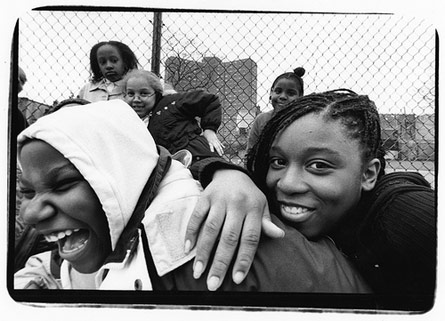
In April, Henry Talbert <http://www.nypost.com/seven/04172007/news/regionalnews/teen_blown_away_at_bklyn_eatery_regionalnews_eric_lenkowitz_and_perry_chiaramonte.htm>, a 16-year-old junior at Thomas Jefferson High School in East New York and an aspiring firefighter, was murdered. The teen was shot in the neck by another youth after an altercation outside a restaurant at around four in the afternoon.
Talbert’s death was not an isolated event. Residents of East New York and neighboring Brownsville must all too often mourn the death of young people brought down by violence. And this so-called epidemic of violence affects other parts of the city and urban communities throughout the nation. In Chicago, there have been <http://www.chicagotribune.com/news/local/southsouthwest/chi-teenshotjun27,1,2492031.story?coll=chi-newslocalssouthwest-hed>34 students shot since January.
Waddell Parks, parent coordinator at Thomas Jefferson High School, has seen too many senseless deaths and injuries. Outraged by these events, he has joined with other community members and school employees to encourage youths to confront the problem. Parks and the Parent Coordinators Coalition to Stop the Violence are developing a comprehensive program to deter youth violence in Brownsville and East New York. The program, operating in conjunction with community-based organizations, will work within the schools. The group hopes to solve the area’s problems from within, using approaches tailored to the neighborhood and developed by people who live there.
|
Conflicts and Resolutions Police in the Schools: Hanging Out and Hurting Business: Breaking the Cycle of Violence: Taking A.C.T.I.O.N. at The Point: Cutbacks After School: |
For example, Parks speaks of putting on a hip-hop revival, “returning to the early days of hip-hop, back before it got so commercial.” While the music now is widely viewed as violent, Parks and other say that, before it became so commercial, hip-hop was credited with helping to reduce violence by promoting hip-hop battles where confrontation was expressed in dance, rhyme and artwork – not with bullets. The group also hopes to create programs to encourage youth to look more critically at the way violence is portrayed in entertainment. Peer mediation sessions will offer more options for resolving conflicts peacefully.
In June, local schools participated in a march and rally to “stop the violence and increase the peace.” The event, held by the East New York Urban Youth Corps and the Parent Coordinators Coalition to Stop the Violence, and organized by community advocate Winchester Keyes, drew close to 1,000 young people and community supporters. Through speeches and a show of numbers, the event tried to make violence less acceptable and so decrease its prevalence. For many of the students who attended, the rally was a starting point.
Following the rally, a number of organizations participated in a family information fair, intended to help connect teenagers and their families to resources in the area. Many groups with important missions go largely unnoticed within the community, Parks said, and this was an effort to “bring them out into the open.”
ROOTS OF THE PROBLEM
“Violence overall is a major problem out here…it’s almost become the norm to solve any conflict,” including minor altercations, arguments, even a stare, said Parks sitting amid stacks of research and literature. “The real problem is the disrespect for black life—for black youth.”
Youth show disrespect for each other, he said, and in turn do not get respect from adults in general and the police in particular. According to local residents, the police presence here is staggering; and the complaints abound. In the latest Civilian Complaint Review Board report, the two precincts covering East New York and Brownsville, the 75th and the 73rd respectively, had the highest numbers of complaints about police in the city. Local leaders attribute this partly to the frequency of “stop-and-frisk” searches of local youth. Because of the prevalence of violence, police don’t respect the neighborhood’s young people and make assumptions, often erroneous, about their behavior. Often police stop the youth, mostly black and Latino, on the streets, and frisk and search them without cause.
“Youth, students, they’re intimidated, harassed, of course it creates hostility. They’re being bullied [by police officers]” said Parks. The stop and frisk searches have recently become the target of the New York Civil Liberties Union and will likely be a subject of upcoming litigation.
As things stand now, police do not respect the young people and the young people do not trust or respect the police and, worse, may feel threatened by them. Such an atmosphere of mutual mistrust makes it difficult to confront the very real problems of crime and violence in the area.
Parks hopes that providing youth with positive activities can change that. Instead of waiting for the teenagers to fail, he believes, community members should provide them with opportunities to excel and resources to succeed. When youth start to respect themselves and each other, Parks added, they can then step up and become the leaders their community needs to take it into the future.
Â
The Brave New World of Ticket Sales

"Buying?" "Selling?" "I got box seats," the scalpers furtively muttered as I walked to Yankee Stadium.
It was a beautiful Saturday in the Bronx - perfect for watching the Yankees. The bleacher seat I coveted was sold out both at the box office and online at Ticketmaster, the Yankee's authorized sales outlet, so I found myself nervously approaching scalpers two blocks from the stadium. The process quickly became uncomfortable. One group of scalpers started fighting over who got to approach me first, while another followed me for a block, angrily demanding to know why I didn't want a ticket in another section.
Not long ago, I would have been out of luck. For years, the only option for a fan seeking a sold-out seat was to buy an illegally scalped ticket, risking an unpleasant interaction, a counterfeit ticket or, in the worst-case scenario, arrest. Fortunately, the day before I had logged on to StubHub and purchased a bleacher seat for $8, plus a $15 service charge, from an anonymous seller.
By buying a resold ticket on StubHub, I became part of a booming secondary market for tickets, which grossed close to $3 billion in the United States in 2006. This largely on-line system charges buyers and sellers a commission in exchange for offering a safe and secure way to sell already purchased tickets. And on June 1, Governor Eliot Spitzer endorsed this approach to ticket scalping, signing legislation that removes from the books almost all of the restrictions on the resale of tickets that have existed since the 1920s. In doing so, New York joined other states that have relaxed laws on reselling tickets. "Ticket scalping laws historically have not worked," said Spitzer. "I think permitting a free market to work its magic there is the smart approach."
Supporters of the new open market believe the new law will fundamentally transform the experience of buying and selling tickets to rock concerts, baseball games and theater performances, promising more choice and convenience for consumers. But others, including some consumer advocates, fear this free-for-all will raise ticket prices, putting many events out of the reach of average New Yorkers.
CHANGING THE SYSTEM
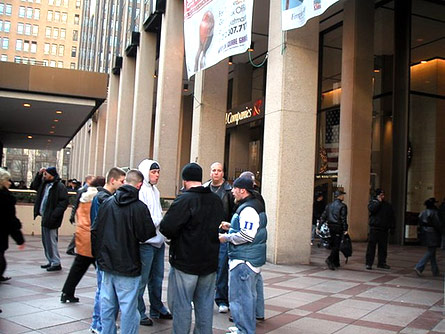
Old anti-scalping legislation allowed only licensed agents to resell tickets. And even they faced restrictions. Tickets to events in large arenas such as Yankee Stadium could be sold for no more than 45 percent above face value. For smaller venues, like a Broadway theater, the limit was 20 percent above the original ticket price.
Under the new law, regular fans, small-scale entrepreneurs and large-scale ticket brokers can all sell tickets - and they can charge as much as they want. Scalping in close proximity to concert halls and baseball stadiums, though, remains illegal. That means my unsuccessful attempt to buy a resold ticket near Yankee Stadium was illegal, while my purchase of the ticket online was perfectly legal. Professional ticket brokers must register with the state and pay a fee, but fans planning to sell fewer than six tickets to a single event are free to do so as they please.
The new legislation also helps websites like StubHub by expressly prohibiting the Yankees and other teams from punishing season ticket holders who resell their unused tickets online. Previously, the Yankees had claimed that the resale of tickets by fans violated the contracts signed by season ticket holders. For example, according to the New York Times, the team revoked a season ticket held by Orlando Bautista, a doctor from Smithtown, New York who had sold six tickets to a game through StubHub.
The legislation has to be renewed in two years, giving hope to opponents of the law, such as consumer advocate Russ Haven of the New York Public Interest Group, that anti-scalping legislation will be restored.
PRODUCERS VS. SPECULATORS
The term "scalping" has been around since the 1880s, when it referred to speculators who bought stocks and grains with the intention of selling them for profit, as well as to agents who sold fake train tickets to passengers. Scalping admission to cultural events has been an issue at least since the 1920s, when New York passed the first anti-scalping legislation.
Until recently, theater owners, sports franchises and other event producers seemed locked in an eternal conflict with ticket speculators. The owners and producers tried to limit the secondary market, while speculators searched for new ways to get their hands on low-priced tickets. The logic behind this conflict was simple: Producers tend to charge less than the market will bear for tickets, either to guarantee a full house or to ensure that regular fans can attend a performance. Ticket speculators have no such scruples and simply want to maximize their profits. Ticket prices also tend to be hard to set in advance, creating opportunities for speculators to buy low and sell high - or to lose money if, for example, a play highly touted in advance turns out to be a box office bomb.
Speculators have resorted to an astounding variety of schemes to get their hands on cheap tickets. The strategies described in a 1999 report issued by then-Attorney General Eliot Spitzer include: hiring "diggers," typically homeless people to stand in line at the box office to buy up as many tickets as possible; using high-speed dialing equipment to buy tickets sold over the phone; and paying "ice," or bribes, to box office employees willing to illegally set tickets aside.
In one case, scalpers opened a counterfeit Ticketmaster outlet with the sole purpose of diverting allotted tickets for resale on the black market. A bogus Long Island outlet sold its sixth set of allotted Barbara Streisand concert tickets to the first person in line, and its 22nd set of tickets to the sixth person in line, the report said, "leading to the conclusion that the outlet operator was setting aside or purchasing tickets, in between sales, for resale to a ticket broker for personal profit." As a result, approximately 50 percent of the seats never went on public sale
In response to such tactics, some theater owners and rock bands tried to fight back. In 2006, the rock musician Tom Petty voided 600 tickets sold through a fan club web site after he discovered that tickets were being re-sold at several times face their value. Petty then offered the tickets for resale on the site, but required that buyers show up to the concert with photo identification to ensure that they were the original purchasers of the tickets.
CALLING A TRUCE?
The Internet emerged to dramatically change the equation. It transformed the sometimes shady world of secondary ticket sales into a safe, secure and booming business. Companies like StubHub, started in 2000 by two Stanford business school graduates and sold to Ebay last year for $310 million, make money by serving as a third party between anonymous buyers and sellers. According to spokesman Sean Pate, 3.3 million tickets were sold on the site last year. By charging both buyers and sellers a 10 percent commission on each sale StubHub garnered over $400 million in gross revenues, a significant slice of the $3 billion generated in online secondary ticket sales nationwide.
Policing secondary ticket sales, which was always difficult, became virtually impossible with the new technologies. This was particularly true in New York, where the anti-scalping law was relatively toothless. All secondary market companies had to do to evade the law was set up shop out of state. And so, according to estimates reported in Playbill, New York City accounted for one-third of all secondary market sales nationwide.
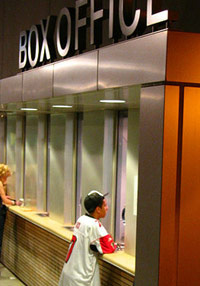 Last year, Broadway owners, long-standing supporters of strict scalping regulations, signaled that they would not oppose legislation ending most restrictions on ticket scalping. In a letter to state officials, Gerald Schoenfeld, chairman of the League of American Theatres and Producers, wrote, "Ticket prices would probably not skyrocket if the cap placed on the resale of tickets were to be lifted." Instead, according to Schoenfeld, "an increase in the number of legal resellers (who comply with licensing and other regulations) will increase legal competition in the marketplace and drive prices down."
Last year, Broadway owners, long-standing supporters of strict scalping regulations, signaled that they would not oppose legislation ending most restrictions on ticket scalping. In a letter to state officials, Gerald Schoenfeld, chairman of the League of American Theatres and Producers, wrote, "Ticket prices would probably not skyrocket if the cap placed on the resale of tickets were to be lifted." Instead, according to Schoenfeld, "an increase in the number of legal resellers (who comply with licensing and other regulations) will increase legal competition in the marketplace and drive prices down."
And the legislation passed this year gives special inducements to theater owners. Those operating venues with 5,000 or fewer seats will have the exclusive right to open resale offices within the 500-foot scalp-free buffer zone. As with StubHub, theater resale offices would make a profit by taking a commission on each ticket sale.
Sports teams have also joined the secondary market stampede. The Mets have their own service, Mets Ticket Marketplace, where season ticket holders can sell individual game tickets for a 10 percent service fee. The Yankees have announced plans to launch their own site, called Pinstripe Management.
THE EFFECT ON TICKET PRICES
The most important issue for many fans is whether or not ticket prices will rise as a result of the new law. According to Pate and Schoenfeld, ticket buyers will benefit from the expansion of the secondary market, because the ease and security of the Internet will make more tickets available for resale. And Economics 101 holds that greater supply leads to lower ticket prices. At the same time, by giving consumers multiple options to choose from, sites like Stubhub.com remove the "information asymmetry" problem common to ticket scalping. It's the difference between furtively approaching a number of ticket scalpers in front of Yankee stadium and reviewing information about ticket prices on the Internet.
But not everyone is convinced. Some argue that an open secondary market will relentlessly increase demand, and thus prices, for tickets. "All this free market stuff is a lot of hooey," Haven of the New York Public Interest Group said. To Haven, ticket sales "are not a traditional marketplace" because the supply of tickets to popular shows can't be increased to match the demand. The result will be a world where "consumers compete against corporate expense accounts for the best seats." While some might say that that is the way things should be in a capitalist system, Haven believes that the fact that most stadiums are subsidized by public dollars also gives "taxpayers a greater interest in fair distribution of tickets at fair prices."
In a contrarian's view, University of Texas economist Craig A. Depken found that cities with anti-scalping laws charge an average of $2 more per game for baseball tickets and $10 for football tickets, essentially because hard-core fans may be willing to pay more than speculators for advance tickets to games where the game's true value is unknown. For example, a ticket speculator might figure that a late September game between the Yankees and Toronto Blue Jays, both currently about 10 games behind division-leading Boston, would be an exercise in futility for both teams - and not a good investment. A die-hard fan would be more likely to imagine the Yankees being locked in a hot pennant race at that point and so would eagerly buy a high priced ticket now to insure being in on any late-season action.
Those knowledgeable about the buying and selling of tickets can cite examples where a free market would bring up prices - and other cases where it might result in lower costs for fans.
In 2002, Princeton University economist Alan B. Krueger sent 12 graduate students to Bruce Springsteen's "The Rising Tour" concert in Philadelphia, where close to 20,000 tickets had been sold for a uniform price of $75. The students interviewed 858 fans and found that between 20 and 25 percent of the fans surveyed had scalped a ticket, at an average price of $280. If all the tickets had been sold at the "market" price of $280 (the average price fans were willing to pay), Springsteen could have collected an incredible $4 million in revenues over and above the $1.5 million he made from selling 20,000 tickets at $75 apiece.
On the other hand, tickets for Barbra Streisand's farewell tour last year, where prices ranged from $150 to $5,000, could be bought for only a quarter of the full price online. "I got three $850 tickets for only $750 from a guy on Craigslist," said concertgoer Ronald Butts. "It's evidence that the free market works both ways."
There are creative strategies that sports teams, theater producers and artists can employ to keep ticket prices low - if they choose to use them.
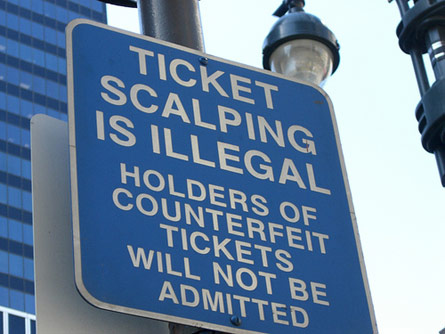
One example is Tom Petty's method of requiring identification to ensure that cheap tickets are being used by the original purchaser. Another is the strategy used by the Public Theater for Shakespeare in the Park. Fans arrive as early as 6 a.m. to line up for free tickets, which are distributed the day of the performance. Each person can get only two tickets, and monitors make sure that people do not jump the line or join friends who are ahead in the queue. In essence, the Public Theater gives fans the opportunity to trade time for money, while limiting opportunities for scalping. In addition, the Public Theater sells a small number of premium tickets for $150 apiece, giving consumers who don't want to wait in line another option.
Independent of the effects of ticket scalping, ticket prices have been rising in recent years, particularly for superstar events like The Police concert tour and the Super Bowl and Broadway musicals. In 1953, for example, orchestra seats for "The King and I" went for $14 in today's dollars, far less than the $65 charged for cheap seats at popular musicals today.
The Sleaze Factor
Price aside, many patrons are pleased to be rid of the illegal scalpers. Fans waiting in line to pick up their tickets at StubHub's Last Minute Service Center four blocks from Yankee Stadium agreed that StubHub's biggest advantage over illegal scalping was security. For example, the company offers refunds on tickets that are counterfeit or arrive too late. As one customer picking up two tickets said, "If you go to an [illegal] scalper, you never know what you're going to get."
Karl Silcox, manager of StubHub's Last Minute Service said that, perhaps in recognition of this some illegal scalpers are already starting to sell their tickets through StubHub instead of in front of Yankee Stadium, although he hastened to add that it's the "more respectable guys" who are choosing that option. Over time, the law might put the worst of the ticket scalpers out of business, or at least force them to change their ways.
Back at Yankee Stadium, I settled into my bleacher seat, where my $5 soft-serve ice cream quickly melted in the hot sun. I was pleased with my vantage point - and the price I had paid for it. Still, some things remain open to chance. Despite all the hard work I put into getting a ticket to the game, the A's battered the Yankees 7-0.
Aubrey Fox is project director of Bronx Community Solutions, aimed at changing the Bronx court system's approach to low-level crime.
Â
Taking Aim at Illegal Guns

On many nights Shaun Cheeseboro is awakened at 1 a.m., 2 a.m. or 3 a.m. by the cacophony of gunfire.
A 22-year-old resident of a New York City Housing Authority project on the Lower East Side, Cheeseboro, who just graduated from college with a degree in anthropology, vows to move out of the neighborhood by November. The gunfire and violence that saturate the streets where he grew up, Cheeseboro said, are far from welcoming.
"I'll go about my day as long as I'm home by 10 p.m., because I'm afraid I'll get shot," said Cheeseboro at a recent town hall meeting on violence in lower Manhattan's housing projects.
Cheeseboro is not alone. Gunfire still echoes through many city streets, even though New York City has what are widely believed to be the most stringent gun control laws in the country.
Faced with this paradox, residents and city officials contend that the guns come from other municipalities and from states with far less restrictive laws, where dealers can buy weapons in bulk and illegally sell them here. And so Mayor Michael Bloomberg has expanded his fight against crime far beyond the city’s borders. He is trying to get illegal guns off streets in New York City by lobbying for legislation in Washington and using covert sting operations to track down so-called rogue gun dealers, mostly in the South. People on all sides of the issue agree that Bloomberg has become the mouthpiece for gun control on the national level. But beyond attracting attention, has his campaign produced any real results?
Crime in New York
New York City has come a long way since 1990. With crime nearing a low not seen in years, recently released statistics from the Federal Bureau of Investigation show the city is the safest of any large metropolis in the country.
While violent crime increases across the nation, New York City's rate fell 4.6 percent in 2006 compared to 2005. Although the city's murder rate rose last year, it is down roughly 74 percent from 1990, according to the New York City Police Department.
Though violence is declining, illegal guns still extract a hefty toll in the city, officials said. In the first half of 2007, the police department’s Deputy Commissioner of Public Information Paul J. Browne said, illegal guns were used in 67 percent of the 232 murders that occurred.
In testimony before a House of Representatives subcommittee last year, Bloomberg said more than 300 people died by the trigger of an illegal gun in New York City in 2005. And, according to Bloomberg, 82 percent of the guns used in crimes in the city were purchased outside of the state.
While some neighborhoods are certainly far safer than others, no neighborhood, street or block is immune from violence. And a bullet can strike at anytime (a weapon was recently fired in Cheeseboro’s neighborhood in broad daylight striking one resident several times).
Tracing Guns
In an effort to stop the shooting, Bloomberg, along with Boston Mayor Thomas Menino, spearheaded Mayors Against Illegal Guns, a bipartisan coalition that in just a little more than a year has attracted more than 225 mayors in more than 40 states. Aimed at eradicating the illegal gun trade, the coalition is intent on repealing the Tiahrt Amendment, which restricts law enforcement’s access to data, compiled by the Bureau of Alcohol, Tobacco, Firearms and Explosives, tracing firearms across the country.
Currently, law enforcement officials can use the tracing data only to investigate a specific crime. For instance, when a gun is picked up at a crime scene, the police department can use the bureau's information to trace the origin of that specific weapon. But, under the amendment, police are unable to look at other data to spot trends or isolate problematic dealers, city officials said.
This was not the case before 2003, when the amendment was first included in a federal appropriations bill. Then, the police department "could use data from all crime guns (which the federal government once provided) to detect patterns of crime gun purchases … from certain gun dealers in certain states," Browne stated in an e-mail. "The information could be used to detect, for example, that a gun trafficker in New York was using one or multiple out-of-state dealers to supply a variety of criminals in the city. Without the overall data, patterns like that may be missed."
Eleven national police organizations have sided with the mayors’ coalition to oppose the amendment and so have dozens of state and local groups, including the New York Association of Chiefs of Police, according to the coalition. New York City Police Commissioner Raymond Kelly has called the restricted data "critically important to the work of law enforcement as we seek to identify where illegal guns are sold and how they wind up in the hands of criminals."
If the amendment were defeated, the coalition contends, data could be shared among law enforcement agencies across state borders to identify those dealers whose weapons account for the majority of gun crimes in America. The last time such data was available, almost five years ago, 1 percent of gun dealers accounted for weapons used in 60 percent of gun crimes nationwide, according to the mayors' coalition.
Gun associations and some members of Congress argue opening up the data would deteriorate the Second Amendment's guarantee for a citizen to possess a firearm and an individual’s right to privacy.
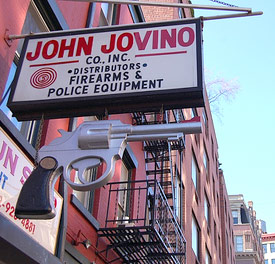 “Mayor Bloomberg and the coalition have been lying to the American public,” said Tom King, president of the New York State Rifle and Pistol Association, which boasts 40,000 members throughout the state. “They have always had access to the trace data as long as there was an ongoing criminal investigation. What they are trying to do is get unlimited access to information that has been off limits for years. It’s an invasion of privacy.”
“Mayor Bloomberg and the coalition have been lying to the American public,” said Tom King, president of the New York State Rifle and Pistol Association, which boasts 40,000 members throughout the state. “They have always had access to the trace data as long as there was an ongoing criminal investigation. What they are trying to do is get unlimited access to information that has been off limits for years. It’s an invasion of privacy.”
For weeks before the Senate committee vote last month, the mayors’ coalition ran commercials in influential districts in an attempt to persuade certain legislators to open up the tracing data. But in late June, the Senate Appropriations Committee rebuffed the coalition’s appeal and instead strengthened the amendment. It passed a measure, proposed by Republican Richard Shelby of Alabama, that would make law enforcement officials subject to prison sentences if they used trace data from the bureau for anything but a specific investigation.
The House Appropriations Committee is scheduled to consider a similar amendment this week.
In a sharply-worded statement responding to the Senate committee’s action, Bloomberg said, “This version of the Tiahrt Amendment is worse than anything we’ve ever seen – and it’s a slap in the face to the men and women who put on a uniform every day and risk their lives to protect us.”
Gun control advocates see the committee vote as a decisive blow to the mayor’s campaign and as another sign of Washington’s long-standing resistance to taking on the gun industry and its lobbyists. For their part, gun organizations hailed the decision as a victory for what they view as their Second Amendment rights.
The Sting
But Bloomberg has not been content to simply lobby on the issues. In the spring of 2006, he sent private, undercover detectives to five states to target gun dealers who had sold weapons allegedly used to commit crimes in New York City, officials said.
The dealers allegedly participated in straw purchases, or sales made to a third party representing someone who would not pass a background check because he or she is a convicted felon. The investigators, city officials said, wore hidden cameras. One investigator inquired about a gun, then the other individual filled out the federal paperwork for a background check.
The investigations in Ohio, Pennsylvania, Virginia, South Carolina and Georgia resulted in lawsuits against 27 dealers filed in two rounds, one in May and the other in December of 2006. Nearly half of the dealers have since settled with the city and agreed to have their businesses supervised for federal compliance by a special master selected by the city and approved by the court. The special master closely monitors the dealers' sale activities and is paid for by the city.
The settlements, which found the dealers sold firearms in violation of federal and state statutes, also sets up a fee structure for future violations ranging from $1,000 for the first offense to $3,000 for the third and subsequent offenses, according to the city.
But some in federal and state government, in Virginia in particular, are fighting the sting operations. The Justice Department has requested the Bloomberg administration "cease and desist" with their covert criminal investigations.
To prevent more Bloomberg-backed lawsuits against local gun dealers, several states are considering allowing only law enforcement – and not private investigators – to conduct investigations of straw purchases. Virginia Governor Tim Kaine signed legislation in March that prohibits anyone but law enforcement from attempting to buy a firearm through illegal tactics. Violators could face up to five years in prison.
One organization in Virginia specifically held a gun raffle in defiance of the metropolitan mayor’s gun control initiative.
The Reaction at Home
Back in New York, though, many applaud the mayor’s tactics.
"He is national leader on the issue, and he has stepped in where Washington has failed,” said Jackie Kuhls, executive director of New Yorkers Against Gun Violence. “Going out to the source of gun crime is critical. If you only wait for someone to be dead from a gunshot, that's too late.”
But such acclaim is not universal. Some gun dealers in the five boroughs said Bloomberg’s efforts in and out of the metropolitan area inhibit law-abiding citizens from owning a handgun.
From his store in Staten Island, which has sold firearms for seven years, Dino Longueira said acquiring a handgun in the city is complicated and exhaustive (most of the time it takes more than six months for a permit to go through). “You have to be somewhat of a paralegal to even go through the process,” said Longueira. “It’s designed in my opinion to discourage people. … I can’t imagine how more restrictive licensing of citizens has anything to do with the drop in crime.”
Bloomberg’s crusade, Longueira said, has assisted the National Rifle Association’s argument: that more restrictions tear away, piece by piece, at the Second Amendment.
But Bob Derrig, a co-owner of West Side Rifle & Pistol Range in Manhattan, said despite the “sneaky” tactics, he agrees with Bloomberg in getting illegal handguns off the street. “Every time they put a new law in it annoys you sometimes, but you get used to it,” said Derrig. “No illegal guns are sold from dealers in New York City. However that doesn't say that a gun I sell to an individual isn’t used in a crime after it's stolen.”
Greater enforcement of the city’s already-established laws goes hand in hand with the gun regulations, he added.
Local political leaders have backed the Bloomberg agenda and readily passed initiatives further restricting access to guns. The City Council worked with Bloomberg to establish the first metropolitan registry of gun offenders, while it also condemned a proposed gun-themed restaurant in Times Square backed by the National Rifle Association. (The NRA eventually abandoned the idea.)
After Councilmember James Davis was killed at City Hall in 2003, the council was even more eager to support gun control initiatives and explored making gun manufacturers liable for gun-related deaths.
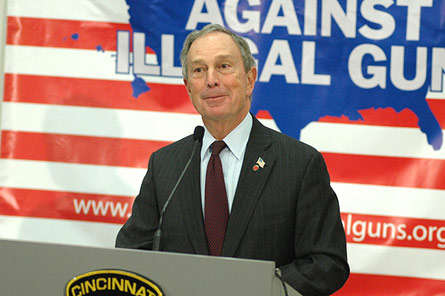
A National Agenda
For his efforts, Bloomberg has been demonized on pro-gun blogs and chastised in conservative editorial pages.
But others have congratulated the mayor for his gun control crusade. “He gets five stars all the way across the board,” said Professor Eugene O’Donnell of the John Jay College of Criminal Justice. “He is a national leader. It’s really a disgrace that he has to be the leader that he has been.”
Bloomberg’s actions have helped fuel speculation that the mayor is seeking the White House. As he chastises a partisan Congress for not doing more to curb guns - among other things – some see him adding to his national profile and building support for a presidential run.
Living In Fear
Back on the Lower East Side, residents who have seen the toll of gun violence for decades have more immediate concerns. They want more law enforcement, safer streets and quieter nights -- now.
The guns in their neighborhood, some residents said, are illegal and come from locations outside of New York, like New Jersey and Philadelphia. They want more police to halt the illegal activity.
Although Cheeseboro plans on getting out, he worries about his two brothers --– teenage boys surrounded by gunfire and at risk of joining the area’s gangs. "I fear for them constantly," said Cheeseboro. “Shootings happen often. I think everyone in the neighborhood is afraid.”
The violence may not mirror that of the 1990s. But advocates said the nation must do more to end the shooting. “There are still children that go to sleep to the sound of gunfire," said Kuhls of New Yorkers Against Gun Violence. "We still have residents that live in fear. The mayor understands that.”
Â




